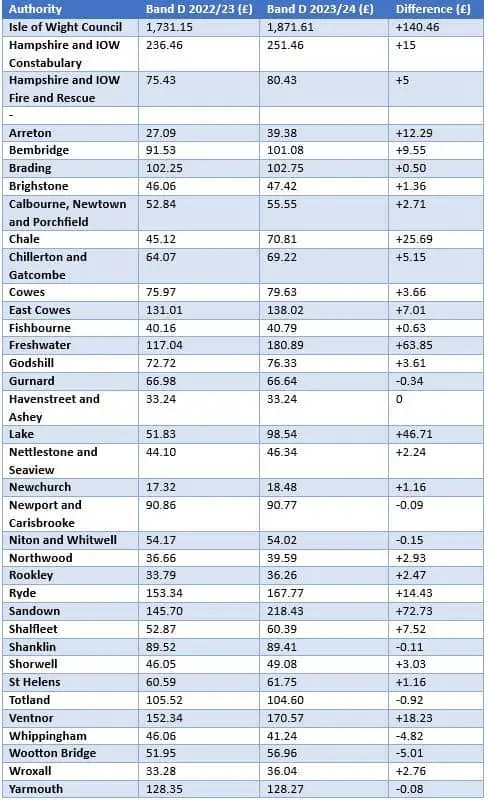How will your council tax bills stack up compared to those on the other side of the Island?
A league table has been produced by the Isle of Wight council, showing the different amounts being charged as council-tax add-on precepts, for all 33 of our town, parish and community councils.
13 per cent average rise
Bills will rise an average of 13 per cent for these precepts in 2023/24 — and while some residents will be lucky to escape any increase, others will face an eyewatering hike.
Eight areas on the Island will face either no change to their bills, or bills will go down — Gurnard; Havenstreet and Ashey; Newport and Carisbrooke; Niton and Whitwell; Shanklin; Totland; Whippingham; and Yarmouth.
Residents in Whippingham will see their precept bill decrease by 10.5 per cent — falling from £46.06 a year to £41.24.
Highest and lowest
The smallest precept on the Island will be in Newchurch – residents will pay an average of £18.48 a year.
Other low-paying areas include: Havenstreet and Ashey (£33.24); Wroxall (£36.04); Rookley (£36.26); Arreton (£39.38) and Northwood (£39.59).
The most expensive precept on the Island is now for Sandown residents — having overtaken Ryde and Ventnor in the rankings — after councillors agreed to raise bills by 49.9 per cent.
It means an average Band D resident in Sandown will pay £218.43 for the town council’s services next year — the only one to charge an average over £200 for its precept.
Other high-paying areas
Other high-paying areas include: Freshwater (£180.89); Ventnor (£170.57); Ryde (£167.77); East Cowes (£138.02) and Yarmouth (£128.27).
Meanwhile, the biggest increase has been in Lake, where taxpayers face a 90.1 per cent increase in their bills.
Lake Parish Council is looking to increase its financial resilience, so a Band D resident’s rate will jump from £51.83 to £98.54.
IWC rise
The precept for town, parish and community councils is paid on top of the Isle of Wight council’s bill and alongside those for the police and fire authorities.
A five per cent increase has been approved by the Isle of Wight Council; a 6.3 per cent increase for Hampshire and Isle of Wight Constabulary; and 6.6 per cent for the Hampshire and Isle of Wight Fire and Rescue Authority.
All the increases will come into effect from 1st April.
This article is from the BBC’s LDRS (Local Democracy Reporter Service) scheme, which News OnTheWight is taking part in. Some alterations and additions may have been made by OnTheWight. Ed





